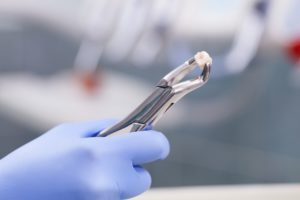A tooth extraction is a procedure where your dental team must remove a tooth from your gums. Typically, dentists will try to avoid pulling your teeth because it is better to have your natural teeth. As a result, you may need a replacement option. While the goal is to save your teeth, there are several reasons why a dentist may need to extract a tooth.

Why An Extraction?
An extraction may be necessary if you have a severe infection in your tooth. Cavities are small pits of decay in the enamel. If you don’t seek treatment, they will continue to destroy the structure of your tooth. Ultimately, your dentist may need to remove the infected tooth.
Additionally, trauma to the tooth may require its removal. For example, cracking a tooth while eating can expose the nerves and blood vessels. When this happens, the structure of your tooth may not be able to support itself. Also, the damage from dental trauma can go well beneath the surface.
Finally, you may need your wisdom teeth removed. Wisdom teeth are the third and final set of molars that come into your gums. Generally, they erupt in your late teens and early twenties. Unfortunately, most people’s jaws are not big enough to hold wisdom teeth without damaging your existing teeth.
Essential Steps for Wisdom Teeth Recovery
To ensure a healthy and pain-free recovery, you should follow your dentist’s recommendations.
First, you should take all prescribed medications, especially any antibiotics. After your procedure, it is possible to develop an infection. Therefore, your dentist will prescribe antibiotics to reduce your chances. It is likely that your dentist will also prescribe pain medication to help your recovery. If you don’t wish to take prescription painkillers or anti-inflammatory medication, you can always use over-the-counter options.
Second, you should avoid using a straw while your extraction heals. Following your surgery, your extraction site will develop a blood clot. This blood clot must stay in place until the area completely heals. Otherwise, you can develop a condition called “dry socket.” Dry socket is extremely painful and can drastically increase your risk of an infection.
Third, you need to take it easy for several days following your tooth extraction. This means that you should rest rather than jump back into your gym routine or intense activities. Raising your heart rate can increase your blood pressure. When your blood pressure goes up, you increase your chances of bleeding during your recovery.
Fourth, you should pay attention to your diet while healing from your tooth extraction. You need to protect the surgical or incision site. This means that you shouldn’t eat anything that is too hot or sharp. For example, eating chips after your surgery is not a good idea. One of the sharp edges can lodge into the wound, which can be painful. Additionally, it can increase the likelihood of developing an infection. Also, eating or drinking hot foods or beverages can dissolve the blood clot.
